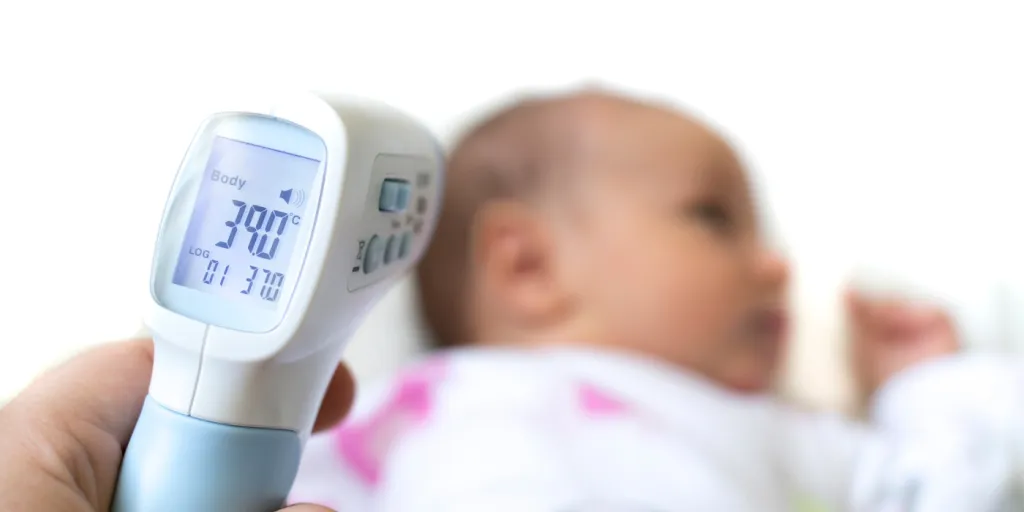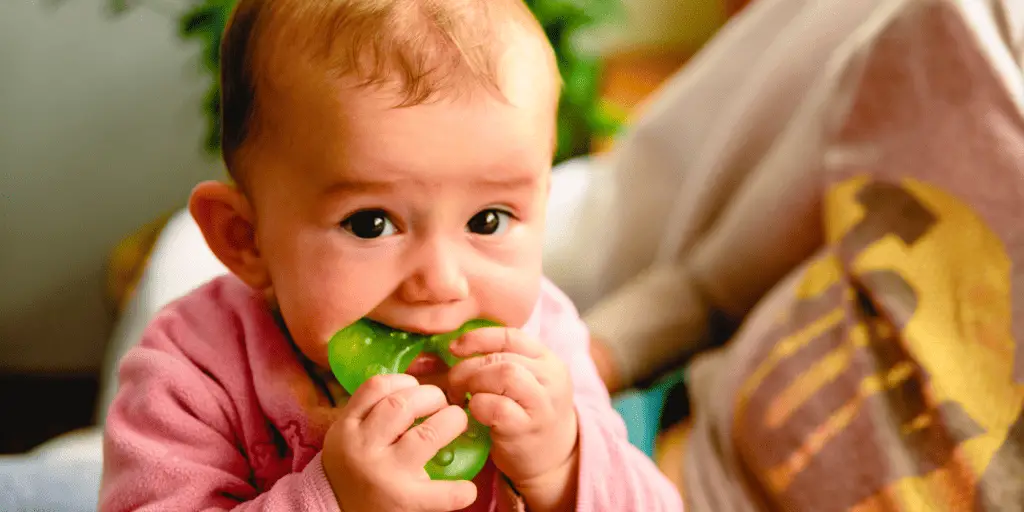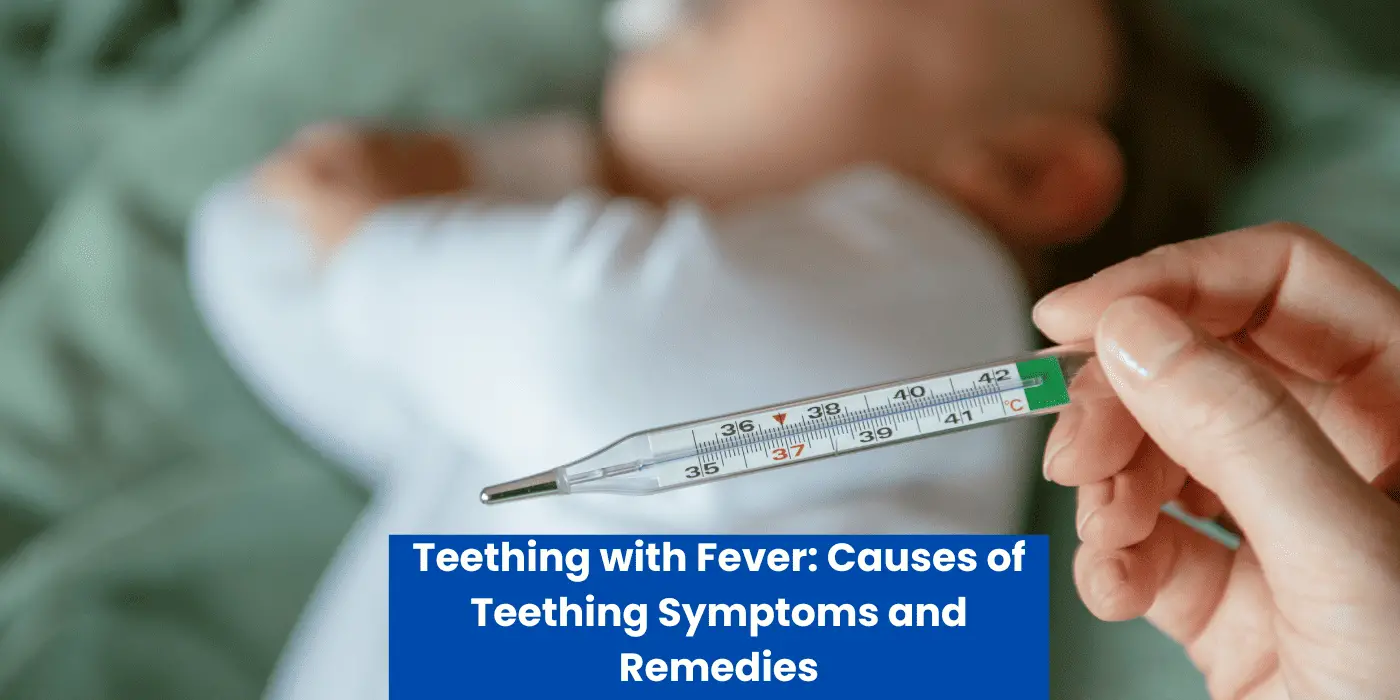Teething is a normal process that every baby goes through, usually starting around six months of age. It is a time when a baby’s first teeth start to emerge from the gums, and it can cause discomfort and pain in the mouth. One of the most common concerns among parents during this time is teething with fever.
While many parents believe that teething can cause a fever, the truth is that fever is not a direct symptom of teething. However, it is not uncommon for babies to develop a low-grade fever while teething. The fever is usually caused by other factors, such as an infection or illness, normal symptoms that happen to coincide with the teething process.
In this article, we will explore the relationship between teething and fever, and provide parents with information on how to recognize the signs of teething and fever in their babies. We will also discuss the treatment options available for babies who are experiencing discomfort and pain during the teething process.

Symptoms of Teething
Teething is a normal process that babies go through as their teeth start to emerge from their gums. It can be a difficult time for both the baby and the parents, but knowing what to expect can help ease the process.
Common symptoms of teething in infants often include increased drooling, irritability, chewing on objects, disrupted sleep, mild diaper rash, and changes in appetite. It’s important to note that not all babies will experience the same symptoms, and any concerns should be discussed with a healthcare professional.
Fever
Many parents wonder if teething can cause a fever. While a slight increase in temperature is normal, it is not considered a true fever. According to Pampers, a low-grade fever of 100.4 F (38 C) or less is possible, but anything higher could indicate an illness unrelated to teething.
If your baby has a fever higher than 100.4 F (38 C), it is important to contact your pediatrician. Other symptoms that could indicate an illness include vomiting, diarrhea, and lethargy.
It is important to note that not all babies will experience a fever during teething, and some babies may have a fever for other reasons unrelated to teething.

Causes of Fever During Teething
Teething is a natural process that all babies go through, but it can be a challenging time for both the baby and the parents. One of the most common concerns during teething is fever. Here are some of the causes of fever during teething:
Inflammation: During teething, the gums become inflamed as the teeth push through the surface. This inflammation can cause a low-grade fever in some babies.
Infection: Teething can also coincide with an increase in exposure to new pathogens. At this age, babies are exploring the world around them by putting everything in their mouths. This can increase the risk of infection, which can cause a fever.
Illness: It’s important to note that not all fevers during teething are caused by teething itself. Almost any viral or infectious illness can lead to fever, from colds and flu to ear infections, urinary tract infections, and meningitis.
It’s important to monitor your baby’s fever and other symptoms carefully. If your baby’s fever is over 100.4°F, it’s a sign that your child is probably sick and needs medical attention. Other symptoms to watch for include:
Fussiness or irritability
Trouble sleeping
Decreased appetite
Vomiting or diarrhea
If your baby is experiencing any of these symptoms, it’s important to contact your pediatrician right away. While teething can be uncomfortable for babies, it should not cause significant or prolonged fever or other symptoms.

When to See a Doctor
Teething can be a challenging time for both babies and parents. While some fussiness and discomfort are normal, it is important to know when to seek medical attention. Here are the signs to look out for:
If your baby is under 3 months old and has a fever of 100.4°F (38°C) or higher, call your doctor immediately.
If your baby is between 3 and 6 months old and has a fever up to 102°F (38.9°C) and seems sick or has a temperature higher than 102°F (38.9°C), contact your health care provider.
If your baby has a fever that lasts longer than 24 hours, call your doctor.
If your baby is not eating or drinking, has diarrhea or vomiting, or seems to be in a lot of pain, call your doctor.
If your baby has a rash or any other unusual symptoms, call your doctor.
If your baby has any of these symptoms, it is essential to seek medical attention as soon as possible. While teething can cause some discomfort and fussiness, it should not cause a high fever or other severe symptoms.
Your doctor can help determine if your baby or infant’s mouth symptoms are due to teething or if there is another underlying issue.
Home Remedies for Teething with Fever
Teething can be a difficult time for both babies and their parents. It’s common for babies to experience a fever while teething, but there are some home remedies that can help alleviate the discomfort. Here are some remedies that you can try:
Offer plenty of fluids or electrolyte drink, but skip out on fruit juices.
Do not over-bundle your child, even if they have chills.
Use a clean finger or wet gauze to rub your baby’s gums.
A cold spoon or chilled teething ring can help soothe sore gums.
Something cold will numb your baby’s gums to help relieve the discomfort of cutting teeth, and will also help to reduce inflammation. Try giving your baby a cold washcloth to chew on.
Bananas, apples, and carrots can be frozen and then gnawed on by your teething baby for both pain relief and a tasty treat.
It’s important to note that if your baby’s fever is over 100.4°F, you should contact your pediatrician. Additionally, if your baby is experiencing severe pain or if their fever persists for more than a few days, seek medical attention.

Prevention of Teething Discomfort
Teething can be a difficult time for both teething babies and parents alike. Fortunately, there are some things you can do to help prevent discomfort during the teething process. Here are some tips:
Massage your baby’s gums with a clean finger or a moistened gauze pad. The pressure can help ease your baby’s discomfort.
Keep it cool. A cold washcloth, spoon, or chilled teething ring can be soothing on a baby’s gums. However, avoid giving your baby a frozen teething ring, as contact with extreme cold can be harmful.
Offer a teething ring made of firm rubber. Avoid teething rings that are frozen solid, as they are too hard for a baby’s mouth. Some people like to use amber teething necklaces.
Continue to breastfeed your baby. Nursing can help soothe them during the teething process.
Stay alert for signs of teething discomfort, such as excessive drooling, chewing on objects, irritability or crankiness, sore or tender gums, and a slight increase in temperature. If your baby has a rectal temperature of 100.4 F (38 C) or diarrhea, talk to your doctor.
By following these tips, you can help prevent teething pain discomfort for your baby and make the teething process a little easier for everyone involved.
FAQS
Why do babies get fevers when teething?
While some babies might develop a low-grade fever during teething, many experts suggest that teething itself is not the direct cause of fever. The exact reason some babies experience fever symptoms during teething remains unclear.
It’s possible that gum irritation and gum pain from the new baby teeth, might lead to a slight increase in the baby’s body temperature.
However, it’s essential to monitor your baby for other symptoms and consult your pediatrician if the fever persists or is accompanied by excessive crying, diarrhea, or other concerning symptoms.
When should I be concerned about a baby teething fever?
You should be concerned about a fever when teething if:
The fever is high (above 100.4°F or 38°C) or lasts longer than 48 hours.
Your baby exhibits other symptoms such as diarrhea, vomiting, a runny nose, or ear pain, which could indicate an underlying illness like an ear infection or a urinary tract infection.
The baby is inconsolable and experiencing excessive crying or discomfort, which could be a sign of more severe pain or another medical issue.
Can teething rings help soothe baby’s gums?
Teething rings are a safe and effective way to help soothe sore gums without using medication. The counter pressure when your baby bites down on the toy can relieve the pain.
Some teething rings can be chilled before giving to your baby, offering even more relief. Educate yourself on the best teething rings for babies to choose the best one for your little one.
How can parents alleviate a baby’s teething discomfort besides using teething tablets?
Parents can try offering a wet washcloth for the baby to chew on, using baby Orajel in moderation, and providing appropriate teething toys. If symptoms like fever or severe fussiness occur, it’s best to consult a healthcare professional.
Can teething cause a fever in babies, and how should parents handle it?
Teething itself typically doesn’t cause a fever. If a baby’s temperature rises, it’s important to consult a pediatrician to rule out any underlying illness. Teething tablets and homeopathic remedies should only be used under professional guidance.
How does a pediatric dentist play a role in a child’s teething phase?
A pediatric dentist can provide guidance on managing teething discomfort, monitor dental development as new teeth erupt, and offer advice on proper oral care. They can also help differentiate between teething symptoms and potential dental issues that require attention.
What are common teething symptoms aside from fever?
Teething may lead to symptoms like increased drooling, irritability, chewing on objects, and disrupted sleep. Some babies may also experience mild diaper rash or changes in appetite. Consulting a pediatric dentist or healthcare provider can help address concerns.
How does the eruption of new teeth relate to a baby’s immune system and teething discomfort?
As new primary teeth emerge, the immune system may respond, leading to mild symptoms like low-grade irritability or fussiness. While teething tablets and baby Orajel may be considered, it’s essential to seek professional advice before use.





